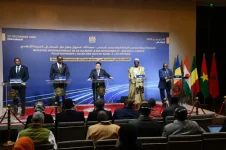Guinea has joined other countries in praising Morocco for its latest diplomatic move. Morocco recently brought together six African nations for talks as part of its leadership of the African Union Peace and Security Council. The countries involved included Guinea, Burkina Faso, Gabon, Mali, Niger, and Sudan. These meetings happened on March 18 in Addis Ababa during Morocco's March chairship of the council.
Guinea's Foreign Minister, Morissanda Kouyaté, sent an official letter to Moroccan Foreign Minister Nasser Bourita about these talks. He described them as a major step forward for managing political changes across Africa. The letter highlighted how Morocco shows great skill in diplomatic matters. Foreign ministers from Burkina Faso, Gabon, Niger, and Mali also sent similar letters of praise.
These other ministers celebrated Morocco's noble initiative. They pointed out how Morocco promotes constructive dialogue based on realism and listening to all sides. Their messages confirmed Morocco's important position on the African political stage thanks to King Mohammed VI's leadership vision. Morocco wants to help these countries speed up their political transition processes.
The Kingdom aims to support these nations through actual projects that address real problems. These include development issues, food security, health concerns, fighting terrorism, and helping them return to constitutional order. Morocco believes in active solidarity among African nations as a core principle. The country feels these six nations should not be left behind in African progress.
Morocco acts based on its deep African roots and connection to the continent. The Kingdom works to help these countries rejoin the Pan-African institution fully. Regular talks let everyone identify the main challenges these nations face during their transitions. These meetings also look at problems like climate change, food security, and public health needs.
The discussions explore practical solutions to overcome transition obstacles. They involve technical departments from the African Union Commission and specialized institutions. These groups assess the scope of problems and implement necessary measures. The consultations fit with Morocco's broader work under King Mohammed VI to promote peace and stability.
Morocco has launched several major initiatives for African development. These include helping Sahel countries gain access to the Atlantic Ocean and the Process of Atlantic African States. All these efforts show Morocco's commitment to building cooperation between African nations. The goal remains to create a more prosperous and stable Africa ready to face its challenges.
King Mohammed VI has established Morocco as a key player in resolving various African conflicts. The country takes a proactive approach based on support and active solidarity principles. Morocco stays committed to addressing the complex problems that stand in the way of Africa's development and stability progress.
Guinea's Foreign Minister, Morissanda Kouyaté, sent an official letter to Moroccan Foreign Minister Nasser Bourita about these talks. He described them as a major step forward for managing political changes across Africa. The letter highlighted how Morocco shows great skill in diplomatic matters. Foreign ministers from Burkina Faso, Gabon, Niger, and Mali also sent similar letters of praise.
These other ministers celebrated Morocco's noble initiative. They pointed out how Morocco promotes constructive dialogue based on realism and listening to all sides. Their messages confirmed Morocco's important position on the African political stage thanks to King Mohammed VI's leadership vision. Morocco wants to help these countries speed up their political transition processes.
The Kingdom aims to support these nations through actual projects that address real problems. These include development issues, food security, health concerns, fighting terrorism, and helping them return to constitutional order. Morocco believes in active solidarity among African nations as a core principle. The country feels these six nations should not be left behind in African progress.
Morocco acts based on its deep African roots and connection to the continent. The Kingdom works to help these countries rejoin the Pan-African institution fully. Regular talks let everyone identify the main challenges these nations face during their transitions. These meetings also look at problems like climate change, food security, and public health needs.
The discussions explore practical solutions to overcome transition obstacles. They involve technical departments from the African Union Commission and specialized institutions. These groups assess the scope of problems and implement necessary measures. The consultations fit with Morocco's broader work under King Mohammed VI to promote peace and stability.
Morocco has launched several major initiatives for African development. These include helping Sahel countries gain access to the Atlantic Ocean and the Process of Atlantic African States. All these efforts show Morocco's commitment to building cooperation between African nations. The goal remains to create a more prosperous and stable Africa ready to face its challenges.
King Mohammed VI has established Morocco as a key player in resolving various African conflicts. The country takes a proactive approach based on support and active solidarity principles. Morocco stays committed to addressing the complex problems that stand in the way of Africa's development and stability progress.












